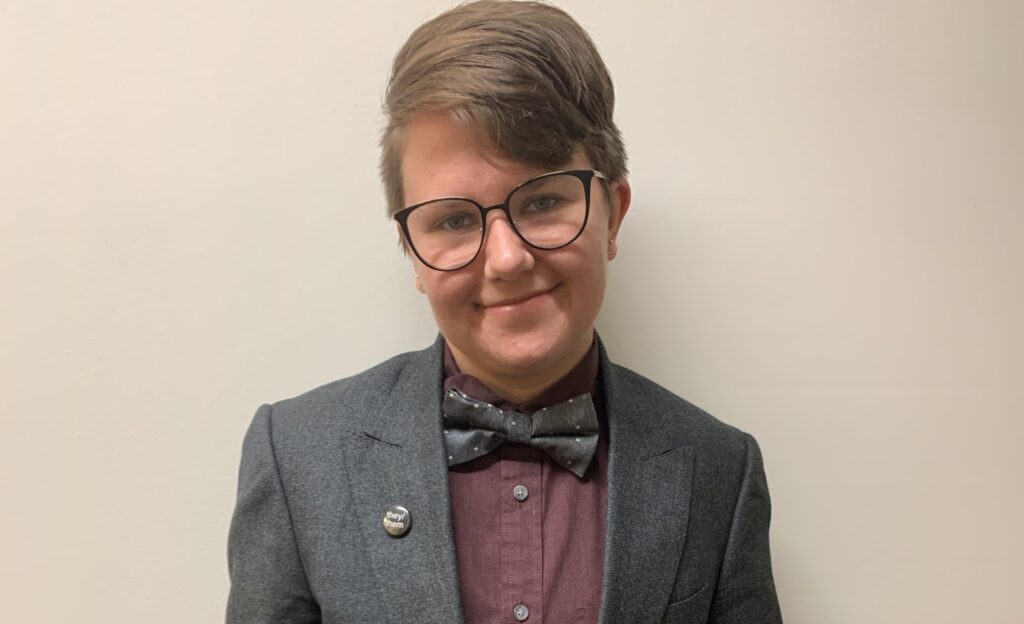
This post was originally written as a “This I Believe” Essay for a seminary assignment on core values and vocation. It was submitted to Montreal Diocesan Theological College on October 25, 2019.
I believe in courageous authenticity.
On February 8, 2019, I stopped at Target on my way home from work. I don’t remember what I went in for, or how I wound up (as I often did) staring at the beautiful clothes in the men’s section, but that day, I stared at a bow tie. It was navy blue, lightly textured, pre-tied (at that point, I could not imagine tying my own), and it was the most beautiful thing I’d ever seen. It was $16.99, and I spent several minutes staring, deciding whether it was really worth the cost.
When I was seventeen, I really wanted to wear a bow tie. I had even bought one in light purple, but I was always too afraid to wear it out of the house, and I soon relegated it to being something I tied on my suitcase to tell which one was mine at the airport. I had known, at seventeen, that I was neither a boy nor a girl, but my conservative faith tradition had one mould for me: so-called “Biblical womanhood.” So I piled all the differently gendered parts of myself into a clown car that never quite fit: there was always an arm sticking out some window or a door that wouldn’t close.
On February 8, 2019, I bought the bow tie. And because the 2019 version of me was just a little less afraid than their 2013 counterpart, I worked up the courage to try it on. I was scared to look too masculine, so I put on some makeup, and fastened the tie. When I saw myself in the mirror, it comforted something I hadn’t known was wrong, like seeing someone from your childhood that absence had taught you to forget. It was a joyous reunion. In a whirl of excitement, I tried on every one of my collared shirts with the bow tie, rejoicing as I saw myself in each one. The next week, I started wearing a bow tie to work, and now, I’m rarely seen without one.
When I say that I believe in courageous authenticity, you have to understand that it is both joyous and incredibly costly. My bow ties are sometimes met with stares, comments, confusion. And if breaking gender roles is costly, authenticity about my gender identity is more costly still. “She” and “her” are weapons, and there are plenty of people who know exactly how to wield them and cause the most damage. There is at once a tremendous gain and a significant loss. But in the words of Bromleigh McCleneghan, “The glory of God is the human person fully alive. Not repressed, shamed, afraid, or lonely.” God has gently called, and is gently calling me further into God’s glory.
It is with this courageous authenticity that I approach my vocation. Although it is incredibly important for LGBTQ+ youth to see people like them speaking from pulpits and presiding at altars, my queerness contributes to ministry in ways far beyond that of mere issues of representation. The truth is that God calls us all out of our respective closets. God calls us to embrace the parts of ourselves that do not fit into neat little boxes. And none of us is free until we’re all free.
Although I do not yet know this for sure, I suspect that a major part of my vocation will involve creating spaces and shaping community. None of us is able to be truly a part of Christian community until we can bring our authentic selves to the table—of course we need boundaries, but there also needs to be something real.
Part of what enthralls me about Anglicanism is the real-ness and tangiblity of the Sacraments. The first time I ever assisted my priest from Ohio, Rachel, at communion, I didn’t know what to do. I was surprised she had asked me, because at that point, I wasn’t even an Episcopalian. I was just some kid who came every Wednesday evening for the Sacrament. I felt a little awkward and lost assisting her, but when I held the chalice and served people the blood of Christ, I had a brand new understanding of what ministry meant. I was overwhelmed with God’s kindness in letting us help God feed God’s own people.
And my vocation will also require courage. A priestly vocation requires the courage to face suffering with your parishioners, to perform funerals, and to hold space for grief, loss, fear, and doubting. Today, the priesthood also requires the courage to face the problems of the Anglican church head-on. It requires the courage to try creative solutions that might fail, to persevere amidst dismal statistics and narratives of decline.
I am called to be more than just a Token Queer™, but I also don’t think that God gave me these intersection of identities just to make life more difficult. George Sumner says that to be a priest is, in part, to be a symbol, representing God to the people as you celebrate the Eucharist. I think that a non-binary priest can represent something really special about God’s kin-dom. God is neither “male” nor “female,” and neither am I. God is beyond our typical conceptions of gender, and I can represent that in a way that men and women cannot. My gender can help people live into non-dual thinking and help rupture binaries.
But whether it’s building inclusive, authentic Christian communities, celebrating the Eucharist, or sitting with people on their most difficult days, it takes the authentic presence of someone who knows God’s love for themselves and for others, and the courage for that person to be able to represent God wholeheartedly. Because of my gender identity and sexual orientation, I have wrestled with God’s love and come out with a palpable confidence in God’s love. I feel called to share that love.

Thank you so much, for your care and thought. As a parent of a gender fluid teenager, who has lost sense of God existing after several bad mental health episodes, I hope and pray that your ministry can help others along the way, to both have the courage to be themselves and to love themselves whatever life throws at them.
Thank you for your authenticity and courage. May we all keep learning to be so.